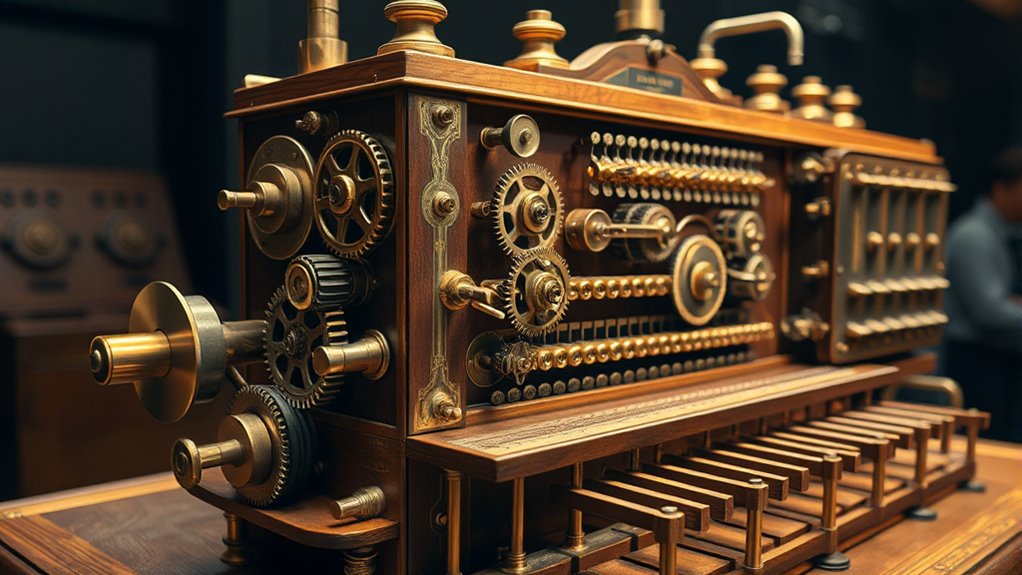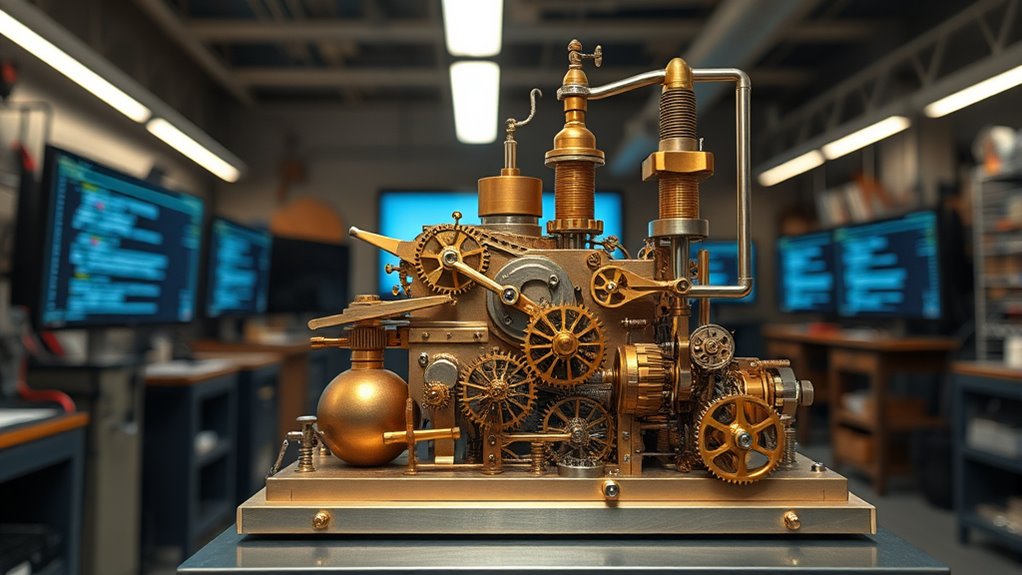Babbage’s pioneering ideas have inspired many modern projects that explore mechanical computing for specific tasks. Today, engineers and researchers revisit his designs to develop hybrid and specialized machines that blend mechanical and digital elements. These efforts honor his legacy by pushing the boundaries of automation and programmability. If you continue exploring, you’ll discover how his visionary concepts still influence innovative efforts in computing today, shaping the future of both mechanical and hybrid systems.
Key Takeaways
- Modern mechanical computers draw inspiration from Babbage’s analytical engine design principles.
- Researchers develop specialized mechanical devices for educational, historical, or niche computational purposes.
- Projects aim to recreate or emulate Babbage’s concepts to explore alternative computation methods.
- Mechanical computing continues to influence hybrid systems complementing digital technology.
- Babbage’s foundational ideas remain central to ongoing innovation and historical understanding of computing evolution.

Have you ever considered how Charles Babbage’s ideas laid the groundwork for modern computing? His pioneering concepts, especially the design of his analytical engines, revolutionized the way we think about machines that process data. Babbage’s analytical engines weren’t just theoretical; they represented a major leap forward in the history of computation. They were intended to perform complex calculations automatically, using punched cards to input data and instructions—an idea that echoes in today’s computer programming and hardware design. Although his machines were never completed in his lifetime, they leave an indelible mark on the trajectory of computational history, inspiring future generations of engineers and scientists.
Babbage’s analytical engines were among the earliest attempts to build a general-purpose computer, capable of executing a series of instructions to solve different problems. This concept is fundamental to how modern computers operate, making Babbage a key figure in computational history. His vision was to create a machine that could be programmed to perform a variety of tasks, a radical idea at the time. The design included an arithmetic logic unit, control flow, and memory—features that are core to contemporary computing systems. While technology then was limited, his ideas laid out the blueprint for what computers could become.
Today’s mechanical computers, though more advanced, still owe a debt to Babbage’s original concepts. Modern attempts at mechanical computing, like Babbage-inspired projects and analog computers, aim to revisit or adapt his principles for specific applications. These endeavors highlight an ongoing fascination with mechanical computation, especially as a way to explore alternative computing methods. They serve as a reminder that the fundamental principles of automation and programmability are rooted in Babbage’s pioneering work. His analytical engines exemplify how a theoretical framework can influence practical innovation across centuries. Recent innovations in mechanical computation continue to draw inspiration from his ideas, demonstrating their lasting relevance.
In terms of computational history, Babbage’s work marks a turning point—shifting the focus from manual calculations to automated processes. His ideas challenged existing notions of computation, pushing forward the boundaries of what machines could achieve. Modern attempts at mechanical computers often draw inspiration from his blueprint, seeking to emulate or improve upon his original designs. These efforts underscore how Babbage’s legacy continues to shape debates about the future of computing, especially as researchers explore hybrid and mechanical systems that could complement digital technology. His vision remains a cornerstone in the evolving story of computational evolution.
Frequently Asked Questions
What Inspired Charles Babbage to Pursue Mechanical Computing?
You’re curious about what inspired Charles Babbage to pursue mechanical computing. His innovative machinery ideas stemmed from a deep mathematical curiosity and a desire to automate complex calculations. Babbage believed that mechanical devices could improve accuracy and efficiency in mathematical work. His fascination with precision and innovation drove him to develop early concepts for computers, aiming to revolutionize how calculations were performed and laying the groundwork for future technological advances.
How Do Modern Mechanical Computers Differ From Babbage’s Designs?
They say “the devil is in the details,” and modern mechanical computers showcase that beautifully. Unlike Babbage’s purely mechanical designs, today’s prototypes incorporate electromechanical advancements, blending mechanical parts with electronic components for faster, more reliable performance. These modern machines focus on miniaturization and efficiency, whereas Babbage’s designs relied solely on gears and levers, making them more cumbersome. Your understanding of these differences highlights how technology evolves through innovation and adaptation.
Are There Any Active Projects Recreating Babbage’s Analytical Engine Today?
You might be interested to know that there are some active projects focused on historical recreations of Babbage’s Analytical Engine. These efforts aim to build modern prototypes that replicate his original design, showcasing his pioneering ideas. Enthusiasts and researchers work together to bring these mechanical computers to life, blending historical accuracy with modern technology. Such projects help us better understand Babbage’s vision and its influence on computing today.
What Were the Main Technical Challenges Babbage Faced?
You might wonder about the main technical challenges Babbage faced. He struggled with precision engineering, as creating tiny, accurate parts was difficult at the time. Mechanical reliability was another issue because his machines had many moving parts prone to wear and tear. These problems made it hard to build a fully functional engine, and despite his brilliant ideas, these limitations kept his designs from being practical in his era.
How Did Babbage’s Work Influence Digital Computing Development?
You might think Babbage’s work was just about gears and levers, but it laid the foundation for today’s digital revolution. His pioneering ideas about programmable machines directly influence modern computing, inspiring innovations like quantum computing and artificial intelligence. Without his visionary approach, the leap to complex, autonomous systems would be unimaginable. So, his contributions are like the roots of a giant digital tree that continues to grow and evolve.
Conclusion
As you reflect on Babbage’s pioneering spirit, remember that his mechanical machines echo the myth of Icarus—boldly reaching for the stars yet grounded by limitations. Today’s modern computers, like Daedalus’s wings, build on his vision, soaring higher. Your journey into technology is part of that legacy—an ongoing dance between innovation and humility. Embrace it, knowing each step forward honors the dreams of those who dared to imagine beyond the horizon.









